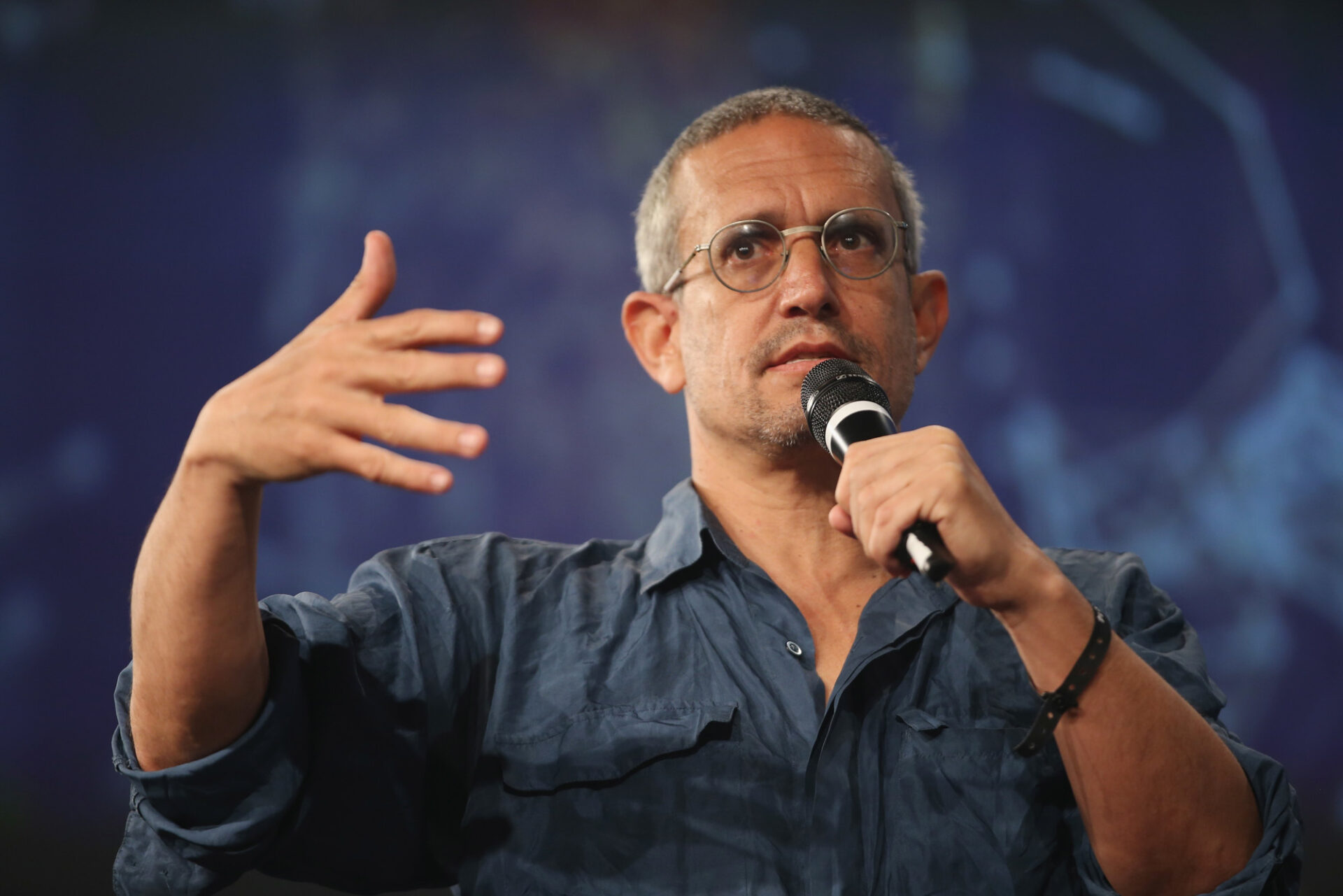People
This Archive is in development, subscribe to our Newsletter to get notified when it’s finished.
There’re 56 people. You're viewing page 3 of 5.

Jacques Servin (The Yes Men)
Jacques Servin is an American media artist and activist. He is one of the leading members of The Yes Men, a culture jamming activist group. Their exploits in “identity correction” are documented in the films The Yes Men (2003), The Yes Men Fix the World (2009), and The Yes Men Are Revolting (2014). As Ray Thomas, he is a co-founder of RTMark.

Jeremy Corbyn
A British politician who served as Leader of the Labour Party and Leader of the Opposition from 2015 to 2020. A Member of Parliament (MP) for Islington North since 1983, Corbyn is on the political left of the Labour Party and identifies as a socialist.
https://en.m.wikipedia.org/wiki/Jeremy_Corbyn

Julieta Gaztañaga
Julieta Gaztañaga is an Argentine anthropologist (PhD, MSc, BA) specialist in the political anthropology of Argentina and the Basque Country. She is a Researcher at the National Scientific and Technical Research Council and an Associate Professor at the University of Buenos Aires (Social Communication Studies and Department of Anthropology). She has carried out extensive ethnographic fieldwork in various provinces of Argentina and southern Brazil, focusing on electoral processes, public works and road infrastructure, integration processes, Peronism, and federalism. Her current research is about social movements in the Basque Country, in fields that include self-determination claims, sovereignty, political imagination, and nationalism. She has received academic recognition in Argentina and acted as visiting scholar in the Basque Country (UPV/EHU), France (EHESS), England (Manchester and LSE), Chile (U.C. del Maule) and Brazil (Museu Nacional-PPGAS). She has an extensive record of publications and large experience of directing funded research projects and research advisership. In addition to his academic work, she is also dedicated to the field of visual arts, in which he has been systematically trained since 1990’s. The fusion of both interests is condensed in the search for a political and aesthetic expression of social life from a Heraclitean vision of the creation and transformation of human possibilities.
E-mail: julieta.gaztanaga@conicet.gov.ar
David Graeber’s published translations
Valor, política y democracia. DOI: 13140/RG.2.2.35269.83686 https://www.researchgate.net/publication/376797153_Graeber_Valor_politica_y_democracia_Trad [2011 Value, politics and democracy in the United States. Current Sociology 59(2) 186–199]
Graeber, D. El valor es lo hace emerger a los universos. Revista Quid 16, Vol. 18, 8–34. https://publicaciones.sociales.uba.ar/index.php/quid16/article/view/8106 [2013 It is value that brings universes into being HAU: Journal ofEthnographic Theory, 3(2), 219–243.].
David Graeber y David Wengrow “Cómo cambiar el curso de la historia humana, o al menos lo que ya pasó”. En: https://www.elsaltodiario.com/el-rumor-de-las-multitudes/como-cambiar-el-curso-de-la-historia-humana-o-al-menos-lo-que-ya-paso (with J. Piñeiro) [Eurozine 2018 “How to change the course of human history (at least, the part that’s already happened)”]
(with Andrej Grubačić) “Introducción a El apoyo mutuo. Un factor iluminado de evolución”. En: http://comunizar.com.ar/david-graeber-and-andrej-grubacic-introduccion-apoyo-mutuo-factor-iluminado-evolucion/ Introduction to Mutual Aid: An Illuminated Factor of Evolution by P. Kropotkin
Hacia una Teoría Antropológica del Valor: la moneda falsa de nuestros sueños. Buenos Aires: Fondo de Cultura Económica, ISBN 978-987-719-131-8, 428 p. https://fce.com.ar/tienda/economia/hacia-una-teoria-antropologica-del-valor/ [2011 Towards An Anthropological Theory of Value… New York: Palgrave]
David Graeber’s nonpublished translations
(2019) David Graeber, “Contra la economía”. [Against Economics, The New York review of books https://www.nybooks.com/articles/2019/12/05/against-economics/?printpage=true]
(2018) Los Chalecos Amarillos muestran cuánto se está moviendo el suelo bajo nuestros pies. [The “Yellow Vests” Show How Much the Ground Moves Under Our Feet http://news.infoshop.org/europe/the-yellow-vests-show-how-much-the-ground-moves-under-our-feet/]
(2014) “Preocuparse demasiado por los demás. He aquí la maldición de las clases trabajadoras”. [Caring too much. That’s the curse of the working classes In: http://www.theguardian.com/commentisfree/2014/mar/26/caring-curse-working-class-austerity-solidarity-scourge]
(2014) What’s the Point If We Can’t Have Fun? David Graeber 2014 No. 24 January https://thebaffler.com/salvos/whats-the-point-if-we-cant-have-fun
(2011) Consumo. [Original: Consumption. Current Anthropology, 2011, Vol. 52, 4: 489-511]
(2009) Neoliberalismo o la burocratización del mundo [Neoliberalism. or The Bureaucratization of the World. Chapter 4 of The Insecure American: How We Got Here and What We Should Do about It, edited by Hugh Gusterson and Catherine Besteman, University of California Press].
(2006) David Graeber, “Más allá del poder/conocimiento: una exploración de la relación entre poder, ignorancia y estupidez”. [Beyond Power/Knowledge an exploration of the relation of power, ignorance and stupidity. Malinowski Lecture, LSE.]
(2005) “El fetichismo como creatividad social: o los fetiches son bienes en proceso de construcción”. [Fetishism as social creativity. Anthropological Theory, 5, 407 – 438.]
Nika Dubrovsky’s published translations
2024. Dubrovsky, N. Ciudades Futuras. [Book Future City]. Bifurcaciones-UDLA, Chile. ISBN: 978-956-9501-30-2 (with R. Greene).
Academic websites
https://www.conicet.gov.ar/new_scp/detalle.php?id=27055&datos_academicos=yes
https://www.researchgate.net/profile/Julieta-Gaztanaga
https://scholar.google.com/citations?hl=es&user=CSV9JL4AAAAJ
https://orcid.org/0000-0002-1135-1864
Artist Portfolio and website artinprocess.weebly.com

Keith Hart
Keith Hart is international director of the Human Economy Programme at the University of Pretoria and lives in Paris with his family. His main research has been on economic anthropology, Africa and the African diaspora. He has taught at numerous universities (including East Anglia, Manchester, Yale and the Chicago), most significantly at Cambridge where he was director of the African Studies Centre. He has contributed the concept of the informal economy to development studies and has published widely on economic anthropology. He is the author of The Memory Bank (aka Money in an Unequal World). One personal obsession has been the relationship between movement and identity in the transition from national to world society. But his written work focuses on the apparent impasse between the national limits of politics and the fact that the economy is now global.
David Graeber and the Anthropology of Unequal Society, a review o Debt: the First 5,000 Years
Comment on David Graeber ‘Debt: The First 5,000 Years’
Contribution to a round table on David Graeber
Anthropology as a revolutionary project: David Graeber’s political legacy

Laura Alvarez
Human Rights activist and businesswoman
